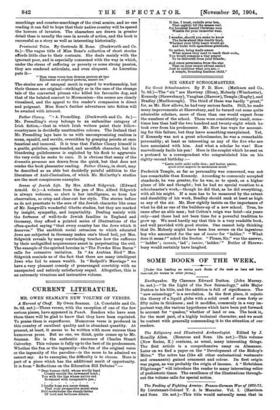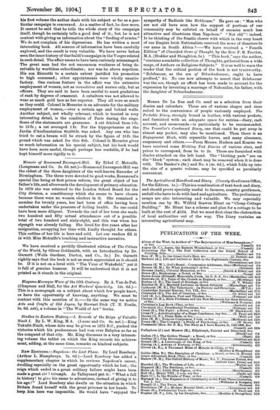his first volume the author deals with his subject so
far as a par- ticular campaign is concerned. As a matter of fact, he does more. It cannot be said that he tells the whole story of the campaign itself, though he certainly tells a good deal of it; but he is not content with giving us information about the " feeding of armies." We do not complain of his digressions. He has written a most interesting book. All sources of information have been carefully explored, and the result is very valuable. We have never before seen the inner history of Garibaldi's campaign in the Vosges related in such detail. The affair seems to have been curiously mismanaged. The great man had the not uncommon weakness of being de- ceivable by worthless subordinates ; nor was he above nepotism. His son Ricciotti to a certain extent justified his promotion to high command ; other appointments were wholly unsatis- factory. One curious feature in the affair was the extensive employment of women, not as vivandieres and nurses only, but as officers. They are said to have been careful to mark gradations of rank by degrees of ornament. A subaltern was not allowed to wear as much gold lace as her superior. They all wore as much as they could. Colonel le Mesurier is an advocate for the military employment of women,—over a certain age and behind walls. Another subject, not wholly relevant, which is treated in very interesting detail, is the condition of Paris during the siege. Some of the statements are gruesome. A cat fetched from 5 fr. to 12 fr.; a rat averaged 1 fr. For the hippopotamus at the Jardin d'Acclimatation 80,000 fr. was asked. Any one who has tried to eat a bream will be struck by the figure of 15 fr. the pound which was asked for this fish. Colonel le Mesurier gives us much information on his special subject, but his book would have been more useful, though perhaps less readable, if he had kept himself more rigidly to it.















































 Previous page
Previous page